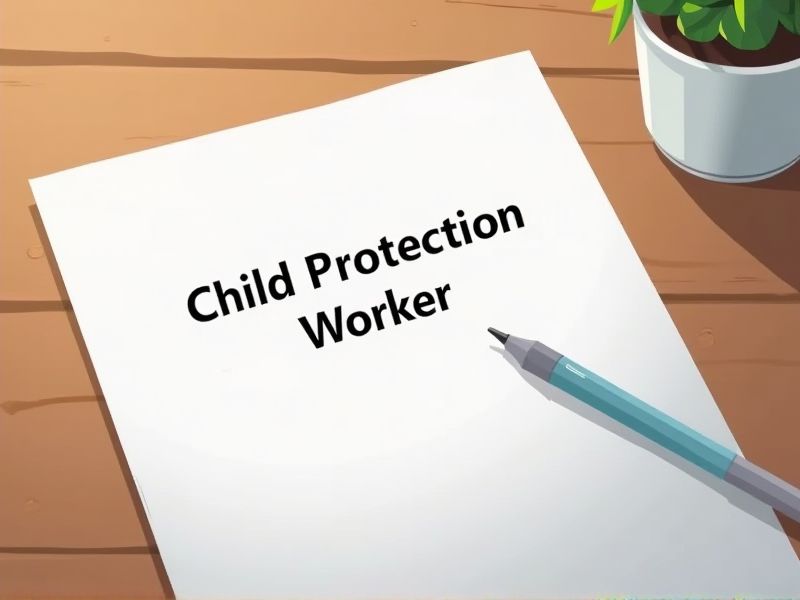
Child Protection Workers deal with sensitive and complex situations involving vulnerable children, which requires specialized knowledge and skills. Certification ensures they understand legal frameworks, child psychology, and crisis management, which are crucial for effective interventions. Certifications also provide credibility, increasing trust with families and within multi-agency collaborations. Here are some important certifications you may need for a career in child protection.
Mandatory Reporter Training Certification
Mandatory Reporter Training Certification equips child protection workers with the necessary skills to identify signs of abuse and neglect, which directly impacts the timeliness of interventions. Certification ensures that workers understand their legal obligations, reducing instances of unreported cases due to lack of knowledge. A standardized training framework enhances consistency in reporting practices, promoting coordinated responses across agencies. This training empowers workers to protect vulnerable children more effectively, fostering safer environments.
Child Abuse and Neglect Recognition Certification
Child Abuse and Neglect Recognition Certification equips child protection workers with the skills necessary to identify subtle signs of abuse and neglect that might otherwise be overlooked. This certification ensures a standardized understanding of abuse indicators, contributing to more consistent and reliable assessments across different cases. By having this certification, workers are better prepared to intervene early, reducing the long-term impact of abuse on a child's development. Comprehensive training through certification enhances the worker's ability to collaborate effectively with law enforcement and health professionals, ensuring a more integrated approach to child welfare.
Trauma-Informed Care Certification
Trauma-informed care certification equips child protection workers with the necessary skills to identify and understand the impacts of trauma on children's behavior and mental health. Proper training leads to more effective communication strategies, which help build trust with affected children. Without this certification, workers may inadvertently harm or re-traumatize the child, making recovery and protection efforts less effective. Certified workers can implement tailored interventions that contribute to a child's long-term well-being and stability.
Child Welfare Management Certification
Child Welfare Management Certification can enhance a child protection worker's understanding of complex child welfare policies, leading to more informed decision-making. Without certification, workers might lack the specialized knowledge necessary to navigate legal and ethical challenges in child protection. Certification often provides access to best practice guidelines, helping workers implement evidence-based strategies in cases they handle. This form of professional development ensures a standardized level of competence and accountability, which is essential for the safety and well-being of children.
Child Protection Advocacy Certification
Child Protection Advocacy Certification ensures that child protection workers possess the necessary skills and knowledge to effectively safeguard children's rights. Evidence shows that trained individuals are better at identifying and addressing signs of abuse or neglect, leading to more timely interventions. Certification requirements align with industry standards, fostering uniformity and best practices across various agencies. With this certification, child protection workers are better equipped to navigate complex legal and social systems, improving outcomes for at-risk children.
Crisis Intervention Certification
Crisis Intervention Certification equips child protection workers with skills to effectively manage and alleviate acute distress situations. Enhanced competencies reduce the likelihood of escalating conflicts, ensuring children's safety and well-being. Training provides workers with tools to identify early signs of trauma, allowing timely and appropriate interventions. Data indicates that certified workers improve outcomes by fostering trust and cooperation among families in crisis.
Ethics in Child Protection Certification
Ethics in Child Protection Certification ensures that child protection workers adhere to established moral principles and legal standards, preventing harm and ensuring the well-being of children. Formal training in ethics enhances decision-making capabilities, allowing workers to navigate complex situations with a clear understanding of right vs. wrong. A certification guarantees accountability and transparency, building trust between the community and child protection agencies. The emphasis on ethics fosters a culture of safety and respect, crucial for sensitive and high-stakes environments like child protection services.
Risk Assessment in Child Welfare Certification
Risk assessment in child welfare certification helps identify potential harm to a child, enhancing early intervention efforts. It allows child protection workers to prioritize cases based on the severity of risk, improving resource allocation. Standardizing assessment processes ensures consistency and reliability in decision-making across different cases. This method equips workers with essential skills and knowledge, fostering informed and evidence-based child protection practices.
Family Dynamics and Conflict Resolution Certification
Family dynamics significantly influence child development and safety. A certification in conflict resolution equips child protection workers with skills to manage and resolve family conflicts effectively. This training enhances a worker's ability to create an environment where children's needs are prioritized. Improved conflict resolution competencies often lead to more sustainable solutions and better outcomes for at-risk children.
Safeguarding Children in Community Settings Certification
Child protection workers require Safeguarding Children in Community Settings Certification to enhance their ability to recognize and respond to potential abuse or neglect. With certification, they gain a comprehensive understanding of legal and ethical guidelines, ensuring compliance with best practices. The course provides necessary tools for effective collaboration with families and community members, fostering safer environments. An informed workforce mitigates risks and improves outcomes for vulnerable children.
Summary
When you obtain additional certifications as a Child Protection Worker, you enhance your professional credibility. Your expertise broadens, leading to more effective decision-making in complex cases. Families and children tend to trust you more, due to your validated competence. Your career prospects improve, opening doors to advanced roles and responsibilities.
